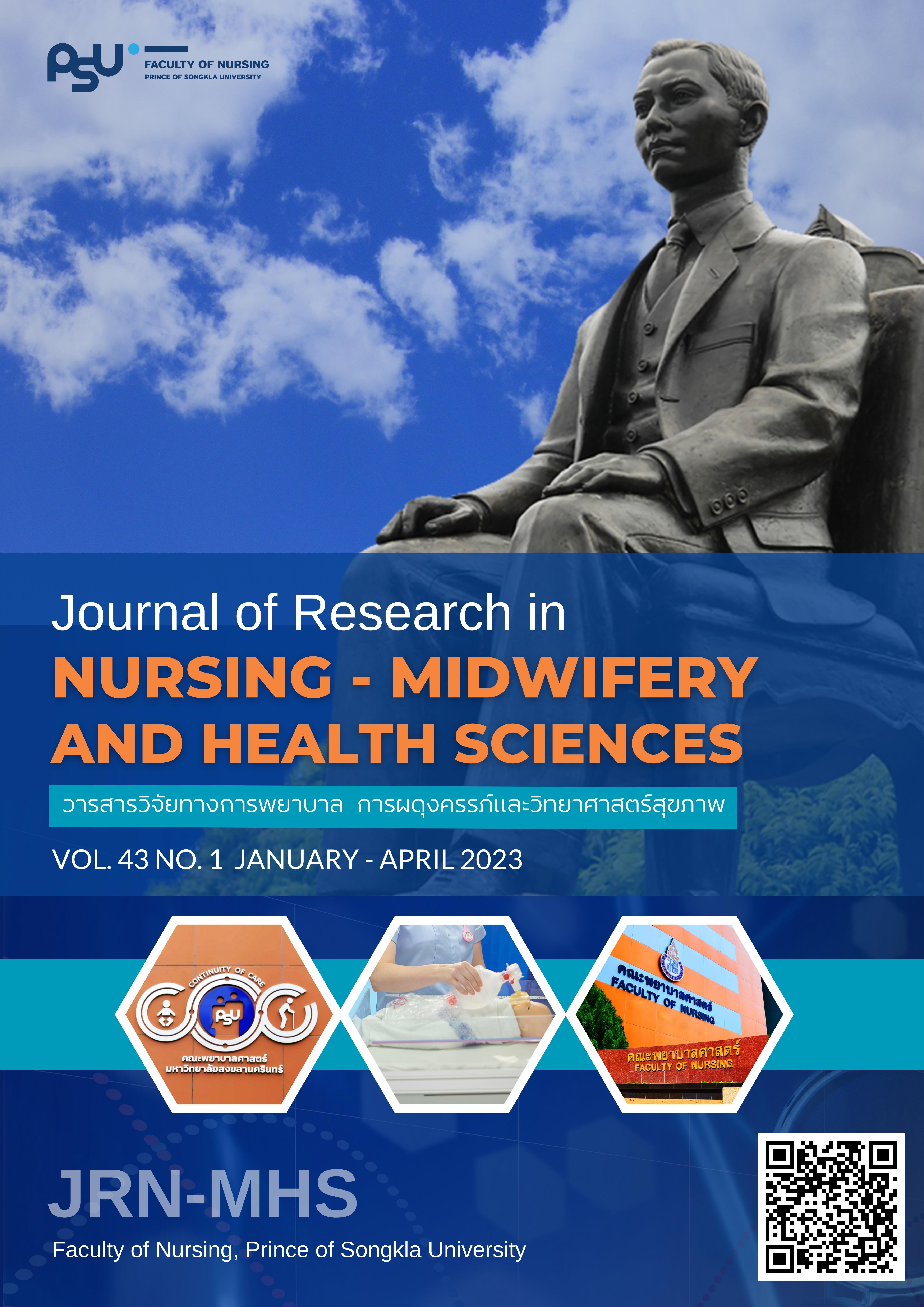Relationship between Post-Concussion Symptoms, Cognitive Function and Quality of Return to Work of People with Mild Traumatic Brain Injury
Main Article Content
Abstract
Objectives: This research aimed to evaluate the quality of return to work and to examine the relationships between post-concussion symptoms, cognitive function, and the quality of return to work of people with mild traumatic brain injury. Methods: Purposive sampling was used to select a sample of 123 patients with mild traumatic brain injury from a tertiary hospital of the southern region. Data were collected using questionnaire comprising 4 parts: 1) personal data form, 2) the Rivermead Post Concussion Symptoms Questionnaire, 3) the Mini Montreal Cognitive Assessment, and 4) the Work Quality Questionnaire. The
2nd to 4th questionnaires yielded content validity indices for scale (S-CVI) of 1.00. Test and retest method and intraclass correlation coefficient were used to examine those questionnaires’ reliabilities, yielding values of .95, .80, 1, respectively. The data were analyzed using descriptive statistics and Biserial correlation coefficient. Results: 69.10% of participants had a quality of return to work. Post-concussion symptoms had a negative correlation with the quality of return to work (rbi = -.40, p < .001), whereas cognitive function had statistically significant positive correlation with the quality of return to work after injury (rbi = .33, p < .001). Conclusion: In order to maintain the quality of return to work in people with mild traumatic brain injury, healthcare professionals should educate them in terms of post-concussion symptoms management and cognitive function promotion before they discharge from the hospitals.
Article Details

This work is licensed under a Creative Commons Attribution-NonCommercial-NoDerivatives 4.0 International License.
References
Dwyer B, Katz DI. Postconcussion syndrome. Handb Clin Neurol. 2018; 158: 163-78. doi: 10.1016/B978-0-444-63954-7.00017-3.
Ratanalert S. Head injury care towards disease specific certification. Bangkok: Sahamit pattana printing; 2018. Thai.
Skandsen T, Einarsen CE, Normann I, et al. The epidemiology of mild traumatic brain injury: The trondheim MTBI followup study. Scand J Trauma Resusc Emerg Med. 2018; 26(1): 1-9. doi: 10.1186/s13049-018-0495-0.
Giza CC, Kutcher JS, Ashwal S, et al. Summary of evidence-based guideline update: Evaluation and management of concussion in sports: Report of the guideline development subcommittee of the American Academy of Neurology. Neurology. 2013; 80(24): 2250-7. doi: 10.1212/WNL.0b013e31828d57dd.
Undén L, Calcagnile O, Undén J, et al. Validation of the Scandinavian guidelines for initial management of minimal, mild and moderate traumatic brain injury in adults. BMC Med. 2015; 13(1): 1-9. doi: 10.1186/s12916-015-0533-y.
Ganti L, Conroy LM, Bodhit A, et al. Understanding why patients return to the emergency department after mild traumatic brain injury within 72 hours. West J Emerg Med. 2015; 16(3): 481-5. doi: 10.5811/westjem.2015.2.23546.
Bloom B, Thomas S, Ahrensberg JM, et al. A systematic review and meta-analysis of return to work after mild traumatic brain injury. Brain Inj. 2018; 32(13-14): 1623-36. doi: 10.1080/02699052.2018.1532111.
de Koning ME, Scheenen ME, van der Horn HJ, et al. Prediction of work resumption and sustainability up to 1 year after mild traumatic brain injury. Neurology. 2017; 89(18): 1908-14. doi: 10.1212/WNL.0000000000004604.
Chu SY, Tsai YH, Xiao SH, et al. Quality of return to work in patients with mild traumatic brain injury: A prospective investigation of associations among post-concussion symptoms, neuropsychological functions, working status and stability. Brain Inj. 2017; 31(12): 1674-82. doi: 10.1080/02699052.2017.1332783.
Chino C, Ekburanawat W. Case study of return to work management: A series of 3 patients. PHJBUU. 2016; 11(1): 123-33. Thai.
Silverberg ND, Panenka WJ, Iverson GL, et al. Work productivity loss after mild traumatic brain injury. Arch Phys Med Rehabil. 2018; 99(2): 250-6. doi: 10.1016/j.apmr.2017.07.006.
Kahan M, Jones KM, Balalla S, et al. Return to pre-injury work following mild traumatic brain injury. Brain Impair. 2018; 19(2): 153-65. doi: org/10.1017/BrImp.2018.7.
Deethongkham D. Relationships between post concussion symptoms and functional performance in patients with mild traumatic brain injury [dissertation].[Chonburi]: Burapha University; 2015. 112 p. Thai.
Mani K, Cater B, Hudlikar A. Cognition and return to work after mild/moderate traumatic brain injury: A systematic review. Work. 2017; 58(1): 51-62. doi: 10.3233/WOR-172597.
Gennarelli TA, Wodzin E. The abbreviated injury scale 2005. Update, 2008 [Internet]. Illinois: Elaine Wodzin; 2008 [cited 2022 Nov 12]. Available from: https://www.nazl.nl/sites/nazl/files/2021-06/AIS0508_codeboek.pdf
Polit DF, Beck CT. Nursing research: Generating evidence for nursing practice. 10 th ed. Philadelphia: Lippincott Williams & Wilkins; 2014.
King NS, Crawford S, Wenden FJ, et al. The rivermead post concussion symptoms questionnaire: A measure of symptoms commonly experienced after head injury and its reliability. J Neurol. 1995; 242(9): 587-92. doi: 10.1007/BF00868811.
Premsai T. Follow up study of patient’ adaptation after mild head injury [dissertation].[Bangkok]: Mahidol University;
71 p. Thai.
Nasreddine Z. Mini Montreal Cognitive Assessment (Mini MoCA) Version 2.1 [Internet]. Canada: MoCA cognitive assessment; 2019. [cited 2021 Jan 15]. Available from: https://www.mocatest.org/paper/
Brislin RW. Back-translation for cross-cultural research. J Cross Cult Psychol. 1970; 1(3): 185-216.
Yen M, Lo LH. Examining test-retest reliability: An intra-class correlation approach. Nurs Res. 2002; 51(1): 59-62. doi: https://doi.org/10.1097/00006199-200201000-00009.
Koo TK, Li MY. Guideline of selecting and reporting Intraclass correlation coefficients for reliability research. J Chiropr Med. 2016; 15(2): 155-63. doi: 10.1016/j.jcm.2016.02.012.
Marshman LA, Jakabek D, Hennessy M, et al. Posttraumatic amnesia. J Clin Neurosci. 2013; 20: 1475-81. doi: 10.1016/j.jocn.2012.11.022.
Wäljas M, Iverson GL, Lange RT, et al. Return to work following mild traumatic brain injury. J Head Trauma Rehabil. 2014; 29(5): 443-50. doi: 10.1097/HTR.0000000000000002.
Fatemeh S, Shiva H. The relationship between critical thinking skills and learning styles and academic achievement of nursing students. J Nurs Res. 2019; 27(4): e38. doi: 10.1097/jnr.0000000000000307.
Vikane E, Hellstrøm T, Røe C, et al. Predictors for return to work in subjects with mild traumatic brain injury. Behav. Neurol. 2016; 2016: 8026414. doi: 10.1155/2016/8026414.
Len TK, Neary JP. Cerebrovascular pathophysiology following mild traumatic brain injury. Clin Physiol Funct I. 2011; 31(2): 85-93. doi: 10.1111/j.1475-097X.2010.00990.x.
Giza CC, Hovda DA. The new neurometabolic cascade of concussion. Neurosurgery. 2014; 75(4): S24-S33. doi: 10.1227/NEU.0000000000000505.


